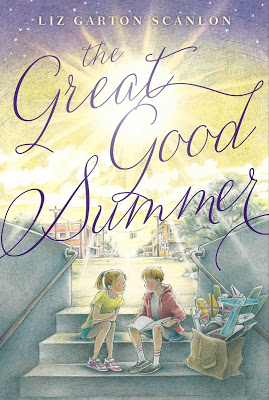 Geez, louise, can we even call it summer reading anymore!? I lost July, and now The Wees and the Littles started school today, the poor things, and the cousin slouches off, pouting, on Wednesday.
Geez, louise, can we even call it summer reading anymore!? I lost July, and now The Wees and the Littles started school today, the poor things, and the cousin slouches off, pouting, on Wednesday.
I’m going to pretend that we’ve got at least until Labor Day. I mean, come on.
In that frame of mind, I’m reviewing a May MG novel – not common around these parts, but I will forever be enticed by a book which deals realistically and critically with faith. I read an interview with the author who felt the importance of this book lay not in the argument between science and faith which wasn’t truly started nor resolved – but the idea that there are flaws in people who don’t believe – and also in those who do. Too often books are unequally weighted one direction of the other.
Full disclosure: Liz is one of my poetry sisters and an in-person friend, as in, we’ve actually met in real life. Sometimes that means one feels one can’t separate the friendship from the work, but I’m happy to give this an unbiased review.
Summary: It seemed like a good idea at the time. Twelve-year-old Ivy’s mother, after a devastating, disheartening fire which incinerated a great deal of their town, and her childhood church, has left to find salvation with a man called Hallelujah Dave of The Great Good Bible Church of Panhandle Florida. No, seriously. Even Ivy can sense the faint ludicrousness of a guy with a name like that, not to mention a church both great and good — and Panhandle is a description, not a town. Mama’s apparently looking for something, so just — up and left, and went… somewhere… because… well, Ivy would like to know why, so when the smart science guy from school, Paul, suggests they just go and look for her, it… makes sense. At the moment. As so many things do. But Mama always even said, not all ideas are good ideas.
Pretty much from the first moment, the trip to Florida by Greyhound is ill-fated – and Ivy is by turns scared, nauseated (ugh) and angry with and by herself, her fellow riders, and Paul. For a road trip, like all of them, in parts it’s long, boring, and grungy, but as a journey of discovery, it turns out to be almost everything Ivy needs.
Peaks: Ivy’s twangy Southern expressions, and Marla Frazee’s ephemeral cover illustration make Ivy and her friend seem young twelves, but Ivy’s emotions – her might-be-crushing-this-hour feelings for Paul, followed abruptly by fury – are spot on for the growing pains of middle grade. Ivy’s got a simple wish, and she learns quickly that everyone’s desires in this world can automatically complicate things. Her desire for simplicity – a simple faith, a simple explanation – are not realized, and the idea that her mother isn’t simply and only hers is a huge, huge lesson for any adolescent. Ivy learns this in a rather dramatic way, but with her demonstrated resilience, the reader realizes she’s better off for it.
Valleys: This isn’t a valley, per se, but as I chose this as a faith in fiction selection, I wanted more discussion of faith in this novel. At one point, Ivy’s accidental discovery, whilst she was babysitting, of a little Buddha is a really fascinating find – but while it gives her a moment’s pause, she has a regrettable lack of curiosity, and doesn’t follow through with her gushy-voiced teacher about her faith. I wanted to know if she thought the Buddha was an idol, if she wondered if other people in her community were doing other things, if her teacher ever showed up at her church. Of course, my curiosity may have pulled the entire plot off-course. As a “this just in, there other faiths” hint to the reader, it works, and the reader doesn’t lose anything by not exploring faiths other than Evangelicalism – but I wished there were people of other cultures – possibly Latinos, who would be very obviously Catholic? – But again, any of this might have pulled the plot off-track.
Additionally, as this wasn’t Ivy’s Mama’s story, we don’t get a crystal clear picture of what she was seeking, and why she went, and – well, what happened, exactly. She tries to articulate it, but we’re stuck with Ivy’s point of view, and we’ll never get it — which is actually okay. She just… blew it. A good Christian Mama blew it – and that’s okay, too.
Conclusion: That’s the real point of the book: we all screw up – Christians, Buddhists, twelve-year-olds, the distinguished, and those who clean up as best they can. And then we all get up, and start again. A deceptively simple concept it takes the rest of us thirty, forty, fifty, sixtymumble years to learn.
I purchased my own copy of this book. You can find THE GREAT GOOD SUMMER by Liz Garton Scanlon at an online e-tailer, or at a real life, independent bookstore near you!